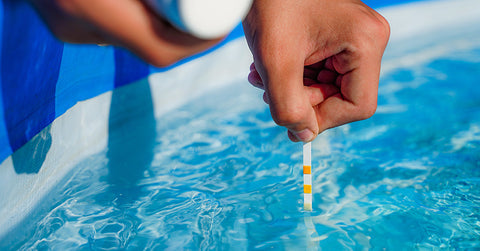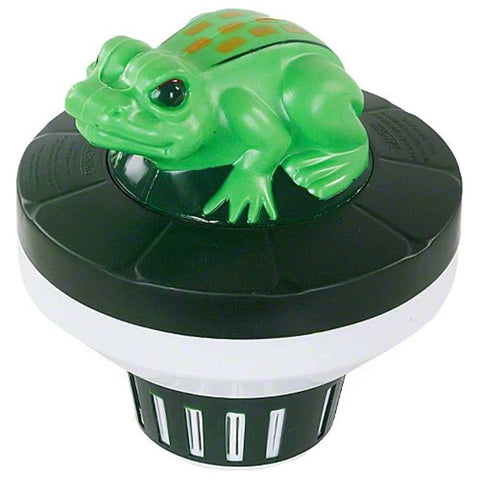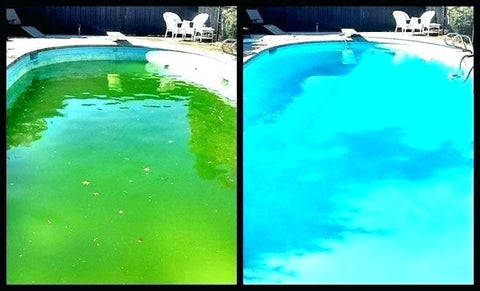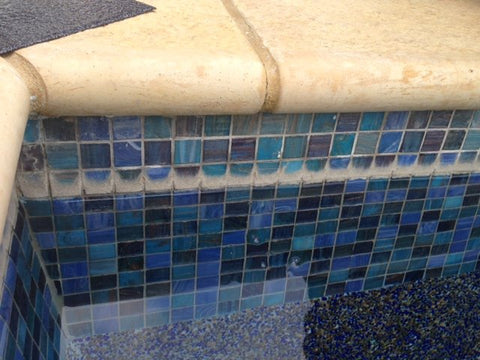
Pool Chemicals for Your Swimming Pool
Five years ago we bought a house that happened to have a pool. I had never lived in a house with a swimming pool before but I did envy the kids in my neighborhood that did have a pool when I was a youngster. We moved in in the month of March. The pool was already open so perspective buyers could tour the house in all it's glory. As we entered the house as new owners it suddenly occurred to me that I had no idea how to maintain a swimming pool.

I am writing this article to help introduce new pool owners and folks considering adding a pool to the basics of pool care. It can seem a little overwhelming in the beginning, so always remember to be patient with your new pool. There are very few things you can do to a swimming pool that can't be balanced out. Worst case scenario would be completely draining your pool. This is never fun but required on rare occasions.
The thoughts and ideas in this post can be applied to above ground and in ground pools. If you have any pro tips for readers please share!
Beginners Guide to Swimming Pool Care
What are we trying to control?
The goal of every pool owner is to have a crystal clear swimming pool for friends and family to enjoy. Having a basic understanding of the water conditions that produce clear healthy water will help when you need to troubleshoot issues.
In my experience, balancing three properties of your water chemistry will keep your pool water clear under most circumstances. I recommend mastering the balance of these three properties first. These properties are alkalinity, pH, and chlorine levels. Don't worry, you don't need a degree in chemistry to maintain a pool. You don't even need to understand alkalinity and pH in the beginning. You can use water test strips to accurately measure these properties with zero computation.
Pool Alkalinity

Always start your process with alkalinity. Perfect pool alkalinity will be the key to balancing your pH and chlorine.
Healthy pool alkalinity is 100 ppm (parts per million). It's just a number so don't overthink it. A range between 80 ppm and 120 ppm is acceptable. There are a variety of products you can add to your pool water to raise and lower your pool's alkalinity. I recommend The Pool Place Alkalinity Plus and pH minus to raise and lower alkalinity.
Pool pH
Balancing your pool's pH is important because you sanitizer, usually chlorine, relies on balanced pH to work efficiently and effectively.
A pH reading can range from 0 to 14, 0 being the most acidic and 14 the most basic. 7.4 is the ideal pH for swimming pool water. You don't have to understand pH at first. Just use your pool water test strips for this reading as well. Like alkalinity, healthy pool pH can range from 7.2 - 7.6.
Pool Chlorine Levels

Similar to alkalinity, pool chlorine is measured in parts per million (ppm). Your chlorine should measure within the range of 1 ppm - 3 ppm. This property can also be easily measured using pool test strips.
Chlorine is your sanitizer. It is the chemical that keeps all the bad guys from setting up camp in you pool water including algae and bacteria. Swimming pool chlorine is sold in a variety of forms including granular, powder, liquid, and solid tablets. You can experiment with different products and find your favorite. I recommend using chlorine tablets in a floating dispenser.
Keeping these properties in balance will produce clear safe water under most circumstances. Keep in mind that events like heavy rain and heavy pool use can quickly alter your pool's chemistry. I recommend testing your water a couple of times a week.
Common Issues With Swimming Pool Water
Now that you understand the foundation of water balance, let's discuss some common issues that pool owners experience.
Clearing Cloudy Pool Water

Cloudy pool water is tricky because it can occur even when your foundational chemistry is balanced. If you experience this, you will want to check your filter and make sure it's functioning properly. Your filter removes the tiny particulates from your water. If these particles are not consistently filtered out of your water cloudiness will occur.
Poor pool water circulation can also lead to cloudiness. Always keep your skimmer and filter baskets clean to insure circulation is not impeded. Circulation distributes your sanitizing agent into all parts of your pool. It also moves the water to and through your pool filter. You should check and clear your baskets a couple of times a week.
If everything seems to be in order, pool water clarifiers are available. Clarifiers are chemicals that will aggregate small particles that pass through your filter into larger particles your filter can remove. I recommend The Pool Place Super Clarifier.
Algae In Your Swimming Pool

Algae can be a thorn in pool owner's sides. In most circumstances, algae can be controlled using a pool shock product. These products also come in a variety of forms including granular and liquid. Both are effective in controlling algal growth.
Sometimes shocking your pool doesn't take care of the problem. In this instance you can try doubling the amount of shock recommended for your pool's volume. If that doesn't work it time to add an algaecide to your water. Algaecides are formulated in varying concentrations. I recommend starting with the lowest concentration and working up. The Pool Place produces three concentration formulas, Algae Guard 30, Algae Fight 50, and Algae Kill 60.
Some types of algae are persistent and difficult to kill, especially black algae. It is best to take care of unwanted algae as soon as you notice it. Algae will take pool surfaces over very quickly. The more algae you have the harder it is to get rid of.
A few years ago a friend of mine with a pool had a party and several attendees. A few of these guests had been on a boat and swimming in the Tennessee river. The swam at the party in the same suits they had worn swimming in the river. These swim suits carried a species of algae from the river into my friends pool. This particular algae took a long time and a lot of work to remove. In fact she had to completely drain her pool and sanitize all of the surfaces. Although cases like this are rare, it's worth noting.
Calcium Hardness and Swimming Pools

The calcium levels in your pool depend on the water supply used to fill the pool. Not all water sources will produce calcium hardness issues.
You can purchase test strips to accurately measure your pool's level of calcium hardness. Negative calcium levels can cause your water to become slightly corrosive. The isn't a swimmer health issue but over time this condition will begin to degrade your pump, filter, grout, and tile. This process is called corrosion.
On the other hand, if your calcium hardness levels are too high a phenomenon known as scaling can occur. In this case, deposits will begin to form in your plumbing and on the surface of your tile. These mineral deposits are very hard to remove. A zero calcium hardness result is ideal.
You can control calcium hardness by adding calcium increasers or calcium sequestering agents offer called scale remover. Calcium Hardness by the Pool Place is used to raise calcium levels and prevent corrosion. Scale Free is a great pool additive that will help prevent scale formation.
In conclusion, your swimming pool is a source of joy and fun for your family. Anyone can learn how to maintain a swimming pool. Over time you will begin to understand your pool and water balance. And, yes, you will experience occasional issues. This is completely normal. If you ever find yourself in a really tricky situation, you can always call in the pros. There is a solution to every pool issue. In my opinion, having a pool is way better than not having a pool. Don't let your worries about maintenance stop you from owning your own pool!
You May Also Enjoy
Pool Shock, Everything You Need to Know
Calcium Hardness In Swimming Pools
Balancing Your Swimming Pool Water
- Introduction
- What we want to control
- Chemicals for cloudy water
- Chemicals to control algae
- Chemicals for pH adjustments
- Chemicals for alkalinity adjustments
- Sanitizing chemicals
- Chemicals for calcium hardness issues
- Conclusion
Key Words
- pool chlorine
- liquid pool chlorine
- pool shock
- chlorine granules
- pool bleach
- chlorine powder
- raise pH in pool
- pool alkalinity
- pool clarifier
- flocculant
- pool flocculant
- calcium hardness increaser
- calcium chloride for pools
- algaecide
- pool algae cleaner
- cloudy pool water
- how to clear pool water
- cloudy pool
